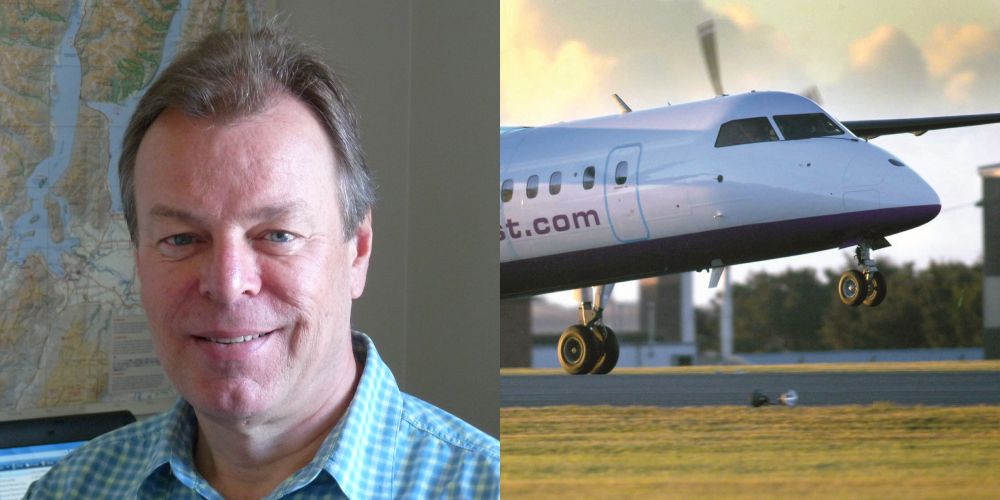
From Eurostar to the Heathrow Express, Paul Le Blond has been involved with some of the UK’s most important transport projects in recent times. He’s now helping the aviation sector to reach net zero.
Is net zero possible in the aviation industry? “Yes,” says Paul (MSc Transportation Engineering 1972). “There is a range of solutions that can help us get there.”
With over 40 years’ experience in the field, Paul works in a voluntary capacity as the Aviation Policy Group Chair in the Chartered Institute of Logistics and Transport. The group advises the government on current aviation matters – such as fighting the climate crisis.
“We suggest how the government should be moving to reach net zero. Increasingly, that’s looking like sustainable aviation fuel (SAF).” SAF has the same chemical composition as fossil-based fuels, so it can be used in existing systems – including plane engines, tanks, and pipelines – with minor modifications. Crucially, it is made from sustainable feedstocks.
“But it’s expensive, and that’s where other solutions can help, too.”
One of which, we suggest, would be to fly less.
But Paul’s approach, developed at Leeds, is to engineer improvements to current systems. “There are diverse opinions. Some groups will say we need to do less of everything. But we can also adapt and improve the systems. Either way, the aviation industry understands the need to get to net zero.”
During Paul’s studies, noise pollution was the primary environmental issue in aviation. “And running out of oil was also a concern back then, ironically,” he says. “I gained a fantastic grounding at Leeds. We learnt how to make things, how to fix things, how much it cost and its value. There were also some brilliant gigs at the Union in the 1970s – and I met my wife at Leeds.”
Paul worked at British Airports Authority (BAA) and BAA plc for 30 years across a variety of roles in airport planning and terminal management at Heathrow, before taking up senior roles as Strategy Director on the Heathrow Express rail project, and then for Eurostar.
During his time as Chair, the Aviation Policy Group contributed to COP26 (the 2021 United Nations Climate Change Conference), presenting a paper on solutions in the industry, such as SAF. “Another option is zero emission aircraft, which are electric, fuel cell or hydrogen powered,” says Paul. “That’s going to be longer term, and it’s a little more limited with battery power to weight ratio issues. But it does work in smaller aircraft and for shorter-range flights.”
Other developments include an increase in aircraft efficiency, which leads to a reduction in fuel usage and flight time, and the use of greener energy within and on access routes to airports. These improvements have made a difference, according to Paul: since peak emissions in 2019, notwithstanding a significant reduction during Covid-19, emissions have fallen. That, in part, is due to the Boeing 747 being “all but retired and replaced” by more efficient aircraft.
Regardless, aviation remains the most carbon-intensive method of travel worldwide. The expansion of London, Gatwick and Luton airports conflicts with lower emission targets, but Paul believes growth can be achieved within the realms of net zero. “We’re suggesting a cap on emissions – and it doesn’t matter how you achieve it. If you don’t achieve it, you don’t continue to grow. That provides a huge incentive.
“Airports might achieve those reductions through fewer flights, or more efficient flights. You might raise the cost of flights to offset the carbon – a cost which is already included in many airfares under the worldwide Carbon Offsetting and Reduction Scheme for International Aviation.”
The international nature of air travel adds a level of complexity, as changes and agreements would need to be implemented across the world. As Paul notes: “There’s no point having battery power if you couldn’t then charge it at the other end.”
COP conferences can therefore play an effective role in this collaboration. Paul points to COP26 aviation agreements and the international coalitions set up, as well as a session at COP28 on sustainable aviation which will involve a cross industry group of academics, suppliers, airports, and fuel manufacturers setting a road map to net zero.
“The key is that the pieces of paper everyone agrees upon are converted into action.”
Further information
Find out more about Leeds alumni making a difference in climate action by visiting Leeds alumni and COP28.
For further details, email Ed Newbould, Digital Communications Officer, University of Leeds at e.w.newbould@leeds.ac.uk